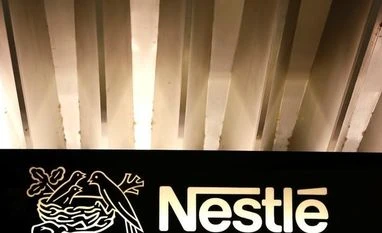Nestle became the latest company to be hit by the global slowdown affecting food manufacturers after posting its weakest underlying sales growth in more than a decade.
The Swiss maker of Kitkat bars and Nescafe coffee cut its sales target for the year, saying European markets would continue to be deflationary, while certain developing markets stay weak.
It forecast no near-term blanket price increases in Western Europe, charting a different course to rival Unilever, whose push to raise prices in Britain in response to a falling pound landed it in a public spat with retailer Tesco last week dubbed "Marmitegate".
"The pound is going south and that is going to have some effect on certain imports and you cannot defy gravity," Nestle Chief Executive Paul Bulcke said on Thursday.
"But I don't say ... our costs go up 1 per cent - bang, we pass that straight on to the consumer - they would punish you," he added.
The company cut its forecast for the year, saying it now expected organic sales to rise by 3.5 per cent after posting a 3.3 per cent increase for the first nine months.
More From This Section
Analysts had on average expected organic growth — which strips out foreign exchange and acquisitions — of 3.7 per cent, according to a Reuters poll.
It would mark the fourth year in a row that Nestle has fallen below its long-term target of 5 to 6 per cent growth, raising pressure on incoming chief executive Ulf Mark Schneider, who will take over in January.
"Investors can hold out hope that the worse it gets, the more likely Schneider will take aggressive actions," Liberum analysts said in a note. "However it may get worse before it gets better."
Nestle joins Unilever, Danone and Reckitt Benckiser in posting disappointing third-quarter results.
Bulcke defended Nestle's performance as being at "the higher end of the industry, especially on volume," which measures the amount of goods sold.
"That's what matters," Bulcke said. "It's a relative game of winning in the marketplace."
Unilever and Danone both relied entirely on price gains for third-quarter growth, but "Marmitegate" shows the difficulty of maintaining that strategy.
Nestle said its UK team was looking at all options to deal with the steep decline in the British currency since Britons voted in June to leave the European Union, including stepping up efficiency efforts in the country, which is its fifth-biggest market globally, representing about 3 per cent of sales.
It said price increases in Western Europe could come later in 2017 if commodity prices continue to rise.
"In an environment marked by deflation and low raw material prices, we continued to privilege volume growth," Bulcke said.
Still, the company's volume growth slowed to 2.5 per cent in the nine-month period, from 2.8 per cent at the half-year point and 3 per cent in the first quarter.
Overall, Nestle's nine-month sales rose one percent from a year earlier to 65.51 billion Swiss francs ($66.19 billion). The figure lagged the average analyst estimate of 66 billion francs in a Reuters poll.
Its shares were down 0.7 per cent at 11:25 GMT.
)